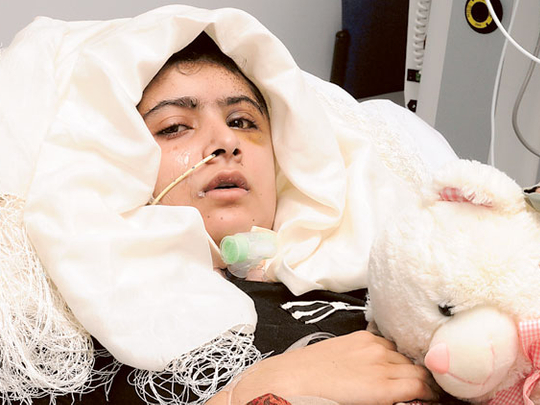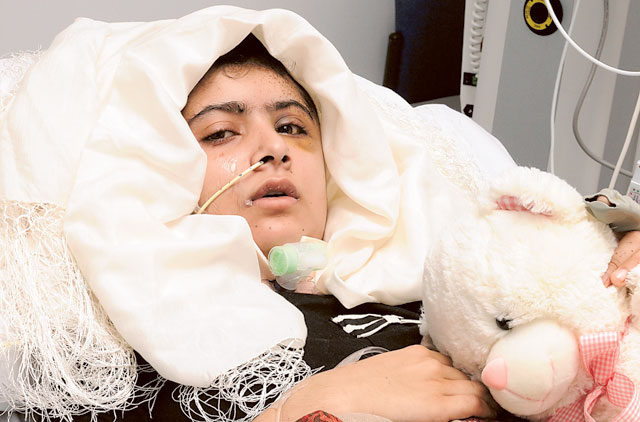
London: The response of Pakistan to the shooting by the Taliban of schoolgirl Malala Yousafzai was a "turning point" for the country, her father said on Friday at the British hospital where she is recovering.
"When she fell, Pakistan stood and the world rose. This is a turning point," Ziauddin Yousafzai said, adding that his 15-year-old daughter was recovering "at an encouraging speed" in the hospital in Birmingham.
"She is not just my daughter, she is everybody's daughter," said her father, who was clearly emotional.
He thanked the doctors at the hospital, where Malala was brought from Pakistan on October 15. Yousafzai said: "She got the right treatment, at the right place, at the right time."
He added: "She is recovering at an encouraging speed and we are very happy."
'Malala will return home'
Earlier report from Islamabad: The father of a 15-year-old Pakistani female activist who was shot and wounded by a Taliban gunman vowed Thursday that she would return home after finishing medical treatment abroad despite new insurgent threats against her.
Since she was shot on October 9 in northwestern Pakistan, Malala has become a hero both at home and internationally, although her work in speaking out against Taliban atrocities and advocating for girls’ education has long been respected and known beyond her native Swat Valley.
The comments by the father, Ziauddin Yousufzai, were recorded by Pakistani state television. He’s expected to fly soon to Britain to see his daughter and it was the first time he has spoken publicly since the shooting.
At the age of 11, Malala began writing a blog under a pseudonym for the BBC about life under the Taliban in Swat. After the military ousted the militants in 2009, she began publicly speaking out about the need for girls’ education. She appeared frequently in the media and was given one of the country’s highest civilian honours for her bravery.
A Taliban gunman shot her in the neck and head as she was in a school bus on her way home from school in the Swat Valley city of Mingora. Two other girls were injured in the attack.
She was airlifted to a hospital in Britain on October 15. The Taliban have vowed to kill her, raising questions about whether it would be safe for her to return but her father dispelled reports the family might seek asylum abroad.
“I first laughed at it because all of our sacrifices, my personal (sacrifices), or this attack on my daughter, cannot have such a cheap purpose that we would go to some other country and live the rest of our life there,” he said, speaking in Urdu.
The Taliban said they targeted Malala because she promotes “Western thinking,” and have vowed to finish the job in the future.
Malala’s father spoke alongside Interior Minister Rehman Malik at the minister’s Islamabad office. Malik promised that the government would protect Malala and her family when they returned.
Malik said Malala had asked her father to bring some of her school books with him when he goes to Britain.
“Even while sitting there she is taking care of her schooling,” said Malik.
Malala has started talking and has spoken to both of her parents by phone, the interior minister said.
The 15-year-old is being treated at Queen Elizabeth Hospital in Birmingham in central England, which has a major trauma center specialising in treating severe gunshot wounds, major head injuries and road accident victims. It is also home to the Royal Centre for Defence Medicine, the primary receiving unit for military casualties returning from overseas.
The medical team caring for Malala at Birmingham hospital said in a statement Thursday that she was comfortable and continued to respond well to treatment.
Last Friday, the hospital released the first photographs of Malala since the shooting showing her lying in her hospital bed and said she was able to stand with help and write.
Meanwhile, the horrific attack on the activist is the latest in a series of assassination attempts by militant sleeper cells in the area over the last year.
The insurgents activated their networks in the Swat Valley to take advantage of the army’s decision to reduce its presence and accelerate the transition of security and governance to civilian authorities in the wake of a big offensive in 2009 to push out the Taliban.
The valley is in little danger of falling under the militants’ control again anytime soon. But the resurgent threat raises questions about the army’s ability to hand over control to civilians in Swat and other areas of the northwest where soldiers are fighting the Taliban, a fundamental part of the military’s counterterror strategy.
Building effective civilian government and law enforcement is not only critical so the military can withdraw, but also to address local grievances related to development and justice that can fuel support for the insurgents.













